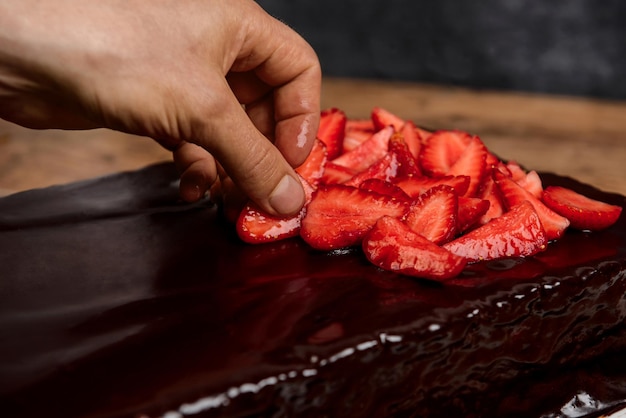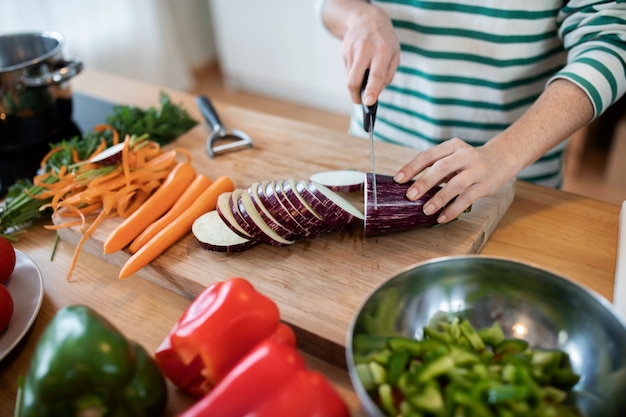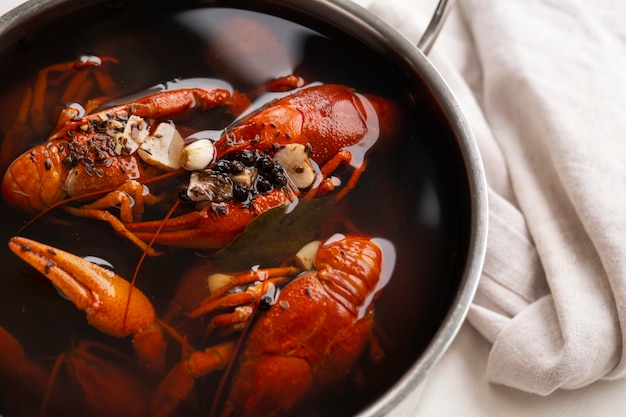Let's be honest, there's something about homemade jerky that just can't be beat. The satisfaction of crafting your own flavour-packed, chewy treat, knowing exactly what goes into it, is truly something special. It's been a passion project of mine for ages, and after countless experiments, I've finally cracked the code to making consistently delicious oven-dried jerky. Now, I'm ready to share my secrets with you. Whether you're a seasoned jerky aficionado or a complete newbie, this guide will walk you through every step of the process, from choosing the perfect cut of meat to perfecting your own signature marinade. So, grab your apron, gather your ingredients, and let's get started on this flavourful journey!
(Part 1) The Meat of the Matter: Choosing Your Beef

First things first, we need to talk about the star of the show: the beef. Now, you might think any old cut will do, but believe me, the choice of meat makes a world of difference in the final product. I've learned the hard way that certain cuts are more suited for jerky than others. You want something lean, with just enough marbling to add flavour and tenderness. For this guide, we're sticking with beef, but if you're feeling adventurous, feel free to experiment with other meats like venison or turkey.
The Leaner, the Better
Why the emphasis on lean meat? Well, it all boils down to the drying process. When you're making jerky, you're essentially removing moisture from the meat, and fat can make that a bit tricky. Too much fat can lead to uneven drying, leaving you with a greasy, unappetizing mess. So, think of lean cuts like sirloin, top round, or even flank steak as your best friends in the jerky-making world. They're naturally low in fat, making them perfect for achieving that satisfyingly chewy texture.
Getting a Head Start on Tenderness
Now, you might be thinking, "Okay, I've got my lean meat, what next?" Well, before we get to the fun part of marinating, there's a little bit of prep work involved. Think of it as setting the stage for a delicious performance. First, you'll want to tenderize the meat. This ensures that the jerky isn't tough and chewy, making it much more enjoyable to eat.
I've tried a few different methods for tenderizing, from using a mallet to pounding it flat, to even a meat tenderizer. But for me, the most reliable and consistent method is a sharp knife and a bit of patience. By making small cuts across the grain of the meat, you're essentially breaking down the muscle fibres, resulting in a much more tender jerky. It's a simple but effective technique that makes a big difference in the end.
(Part 2) Slicing and Dicing: Getting Ready for the Marinades

Now that your meat is prepped and ready, it's time for the fun part: slicing it into strips! This is where the real magic happens, and I've got a few tips to help you create the perfect jerky strips.
The Perfect Strip: Size Matters
You want strips that are about 1/4 inch thick and 2-3 inches long. This size allows for even drying and provides a good bite-sized piece of jerky. I've experimented with different thicknesses, and I've found that anything thinner can become too dry and tough. On the other hand, thicker strips take longer to dry and can be a bit too chewy. So, stick with that 1/4-inch thickness, and you'll be rewarded with a perfect balance of chewy and tender.
Don't Sweat the Imperfections
Don't worry if your strips aren't perfectly uniform. Remember, homemade jerky is all about embracing the imperfections and celebrating the unique flavours that come from a bit of handcrafted charm. Just ensure the strips are relatively even to ensure they dry evenly.
(Part 3) Unleashing the Flavours: Creating Your Signature Marinades

Now, this is where things really get exciting! This is your chance to unleash your creativity and add your personal touch. The possibilities for marinades are endless, and I encourage you to experiment and create your own unique blends. I'll share some of my tried-and-true recipes, but don't be afraid to make them your own. After all, the best jerky is the one you love the most!
The Classic Sweet and Smoky: A Crowd-Pleaser
Let's start with a classic: sweet and smoky. It's a crowd-pleaser that never fails to impress. Here's what you'll need:
- 1 cup soy sauce
- 1/2 cup brown sugar
- 1/4 cup Worcestershire sauce
- 2 tablespoons liquid smoke
- 1 tablespoon black pepper
- 1 teaspoon garlic powder
- 1 teaspoon onion powder
Combine all these ingredients in a bowl and whisk until everything is well blended. Now, add your beef strips to the marinade, ensuring they're fully submerged. Cover the bowl with plastic wrap and refrigerate for at least 4 hours, or even better, overnight. This allows the flavours to penetrate the meat, resulting in a delicious, flavourful jerky.
The Spicy Inferno: A Bite of Heat
If you like a bit of heat with your jerky, this spicy marinade is for you. It's got a kick that will set your taste buds on fire! Here's what you'll need:
- 1 cup soy sauce
- 1/4 cup brown sugar
- 2 tablespoons chili powder
- 1 tablespoon paprika
- 1 tablespoon cayenne pepper
- 1 teaspoon garlic powder
- 1 teaspoon onion powder
- 1/2 teaspoon black pepper
Combine all the ingredients in a bowl and whisk until everything is well blended. Add your beef strips to the marinade, making sure they're completely submerged. Refrigerate for at least 4 hours, or overnight. Remember, this marinade packs a punch, so start with a small amount of cayenne pepper and adjust the spice level to your liking.
The Tangy Teriyaki Twist: A Savoury Delight
For those who prefer a more savoury and slightly sweet flavour, the tangy teriyaki marinade is a winner. It's a perfect combination of salty, sweet, and tangy that will have you craving more. Here's what you'll need:
- 1/2 cup soy sauce
- 1/4 cup mirin (sweet rice wine)
- 1/4 cup sake (japanese rice wine)
- 1/4 cup brown sugar
- 1 tablespoon ginger, minced
- 1 tablespoon garlic, minced
- 1 teaspoon black pepper
Combine all the ingredients in a bowl and whisk until everything is well blended. Then, add your beef strips and ensure they're fully immersed in the marinade. Cover the bowl and refrigerate for at least 4 hours, or overnight. The longer it marinates, the deeper the teriyaki flavour will penetrate, creating a truly irresistible jerky.
Unleash Your Inner Flavour Alchemist
These are just a few ideas to get your creative juices flowing. Remember, the beauty of homemade jerky is that you can tailor the flavours to your own taste preferences. Don't be afraid to experiment! You can add other spices like cumin, coriander, or even a pinch of cayenne pepper for a little extra kick. The sky's the limit when it comes to flavouring your jerky. Just keep in mind that the marinade should be fairly thick and able to coat the meat evenly. You want those flavours to sink in and really shine through.
(Part 4) The Oven-Drying Process: Patience is a Virtue
After your marinade has worked its magic, it's time to move on to the next step: drying the jerky in the oven. While dehydrators and even sun-drying are viable options, I find the oven to be the most convenient and consistent method. Remember, the key to perfectly dried jerky is low and slow. You need to dry the meat at a low temperature for an extended period of time, ensuring it dries evenly without becoming tough and chewy. Patience is key here, my friends!
Oven Setup: Low and Slow is the Way to Go
Preheat your oven to the lowest setting, usually around 170°F (77°C). Remember to check your oven's manual, as the lowest setting can vary between models. Now, line a baking sheet with parchment paper or a silicone baking mat to prevent the jerky from sticking. Place the marinated beef strips on the baking sheet, making sure they don't overlap. This allows for good airflow around each strip, ensuring even drying.
The Art of the Wait: Checking for Doneness
Slide the baking sheet into the oven and leave the door slightly ajar. This helps to vent the moisture and prevent condensation. The drying time will vary depending on the thickness of the strips, the humidity, and your oven's temperature. It's a good idea to check the jerky after about 2 hours. You want the strips to be firm and leathery, but not dry and crumbly. To test for doneness, gently bend a strip. If it bends without breaking, it's ready. If it's too soft, give it a little more time. If it breaks easily, it's probably too dry.
(Part 5) Cooling and Storage: Keeping Your Jerky Fresh and Flavorful
Now, you've got yourself some delicious jerky, but we're not quite done yet. Proper cooling and storage are crucial for ensuring your jerky is safe to eat and that those delightful flavours stay locked in.
Let It Cool Down
Once your jerky is done, take it out of the oven and let it cool completely on a wire rack. This helps prevent condensation from forming, which can make the jerky soggy. You can also use a fan to speed up the cooling process, just make sure it's not blowing directly on the jerky.
Storage Time: Lock in Those Flavours
After the jerky has cooled completely, it's time to store it. The best way to store jerky is in an airtight container in a cool, dry place. This helps prevent it from becoming stale or absorbing moisture. I personally like to store my jerky in mason jars, but you can also use zip-top bags. If you're planning on storing the jerky for a longer period of time, you can also freeze it. Just make sure to freeze it in airtight containers or bags. When you're ready to eat it, simply thaw it in the refrigerator overnight.
(Part 6) The Ultimate Jerky Feast: Enjoy the Fruits of Your Labour
Congratulations, you've made it to the final step: the tasting! Now, resist the urge to dive in immediately. It's always a good idea to let the jerky rest for a day or two before indulging. This allows the flavours to meld and deepen, creating a truly exceptional taste experience. Now, grab a handful of your homemade jerky and revel in the satisfaction of creating a delicious and satisfying treat. You'll be amazed at how flavourful and satisfying it is, especially knowing that you made it from scratch.
(Part 7) Jerky Tips and Tricks: Beyond the Basics
Making jerky is a craft, and like any craft, there are always little tips and tricks that can take your jerky to the next level. These are some of my favourite tips that I've learned through experience, making my jerky even more delicious.
Adding a Touch of Magic: dry rubs
Before marinating, consider adding a dry rub to the meat. This adds another layer of flavour and texture, taking your jerky to new heights. You can use a pre-made rub or create your own with your favourite spices.
The Power of Brining: Unlocking Tenderness
For extra tenderness and moisture, try brining your beef before marinating. This involves soaking the meat in a salt solution for a few hours. You can also add other flavours to the brine, like herbs, spices, or even a bit of sugar. It's like a pre-game for your jerky, giving it that extra boost of flavour and tenderness.
The Smoke Show: Elevating the Flavour Profile
If you're really serious about jerky, invest in a smoker. Smoking the meat before drying adds a unique flavour profile and a slightly chewy texture. If you're looking for that authentic smoked jerky taste, this is the way to go. It might seem like a big commitment, but trust me, it's worth it!
Playing with Sweetness: Finding the Perfect Balance
Don't be afraid to play with the sweetness in your marinade. You can use maple syrup, honey, or even molasses for a richer, more complex flavour. It's all about finding that perfect balance of salty, sweet, and smoky.
(Part 8) FAQs: Answers to Your Jerky Queries
You've got your jerky-making skills in full swing, but some questions may arise along the way. Let's address some of the most common questions I get about homemade jerky.
1. What if my jerky is too tough?
This is a common problem, especially if you've dried the jerky for too long. If your jerky is a bit tough, you can try soaking it in a little water for a few minutes. This should help to soften it up. You can also try chewing it slowly and letting it sit on your tongue for a bit. The moisture in your mouth will help to soften it as you chew.
2. Can I use a dehydrator to make jerky?
Absolutely! Dehydrators are actually designed for making jerky and can produce some excellent results. They're often better at controlling the temperature and airflow than ovens, which can make for a more consistent drying process. If you're serious about making jerky regularly, a dehydrator might be a good investment.
3. What are the best spices to use for jerky?
The best spices for jerky are really a matter of personal preference. I like to use a combination of sweet and smoky flavours, such as brown sugar, paprika, garlic powder, onion powder, and liquid smoke. But you can also experiment with other spices, like cumin, coriander, chili powder, or cayenne pepper.
4. How long can I store jerky?
Homemade jerky, when stored properly, can last for several months. Just make sure to keep it in an airtight container in a cool, dry place. You can also freeze jerky to extend its shelf life.
5. What if my jerky isn't drying evenly?
This can happen if the strips are overlapping or if there's not enough airflow in the oven. Make sure to space the strips out evenly and keep the oven door slightly ajar to ensure good ventilation. You can also try flipping the strips halfway through the drying process to ensure that both sides are drying evenly.
There you have it, your comprehensive guide to making delicious oven-dried jerky! Now, get out there, gather your ingredients, and unleash your inner jerky maker! It's a journey of flavour, patience, and a whole lot of satisfaction.
Everyone is watching

Prime Rib Roast Cooking Time Chart: Per Pound Guide
Cooking TipsPrime rib roast. Just the name conjures images of lavish dinners, crackling fires, and hearty laughter. It’s ...

How Long to Bake Potatoes in the Oven (Perfect Every Time)
Cooking TipsBaked potatoes are a staple in my kitchen. They're incredibly versatile, delicious, and surprisingly easy to m...

Perfect Rice Every Time: The Ultimate Guide to Cooking Rice
Cooking TipsAs a self-proclaimed foodie, I've always been a bit obsessed with rice. It's the foundation of countless cuisi...

The Ultimate Guide to Cooking Asparagus: Tips, Techniques, and Recipes
Cooking TipsAsparagus. The mere mention of this spring delicacy conjures up images of vibrant green spears, crisp and burs...

Ultimate Guide to Cooking the Perfect Thanksgiving Turkey
Cooking TipsThanksgiving. Just the word conjures up images of overflowing tables laden with delicious food, the scent of r...
